See also
| This disambiguation page lists articles associated with the title Virgin Trains. If an internal link led you here, you may wish to change the link to point directly to the intended article. |
Virgin Trains was the operator of the InterCity West Coast rail franchise in the United Kingdom.
Virgin Trains may also refer to:
| This disambiguation page lists articles associated with the title Virgin Trains. If an internal link led you here, you may wish to change the link to point directly to the intended article. |
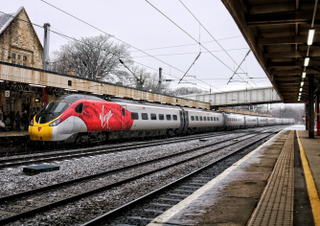
Virgin Trains was a train operating company in the United Kingdom owned by Virgin Rail Group, a joint venture between the Virgin Group and Stagecoach, which operated the InterCity West Coast franchise from 9 March 1997 to 7 December 2019. Virgin Trains operated long-distance passenger services on the West Coast Main Line between London, West Midlands, North West England, North Wales and Scotland. The service connected six of the UK's largest cities: London, Birmingham, Manchester, Liverpool, Glasgow and Edinburgh, which have a combined metropolitan population of over 18 million.

Great North Eastern Railway, often referred to as GNER, was a train operating company in the United Kingdom owned by Sea Containers that operated the InterCity East Coast franchise from April 1996 until December 2007, when Sea Containers was stripped of the franchise due to poor financial management. It operated InterCity train services on the East Coast Main Line.

The InterCity 125 is a diesel-powered passenger train built by British Rail Engineering Limited between 1975 and 1982. Each trainset is made up of two Class 43 power cars, one at each end and six to nine Mark 3 carriages. The name is derived from its top operational speed of 125 mph (201 km/h). Initially the sets were classified as Classes 253 and 254.

InterCity was introduced by British Rail in 1966 as a brand-name for its long-haul express passenger services.
A train operating company (TOC) is a business operating passenger trains on the railway system of Great Britain under the collective National Rail brand. TOCs have existed since the privatisation of the network under the Railways Act 1993.
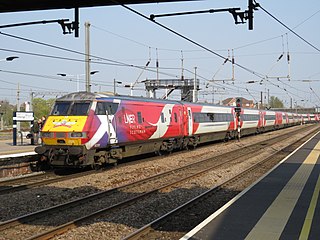
A Driving Van Trailer (DVT) is a purpose-built control car railway vehicle that allows the driver to operate a locomotive at the opposite end of a train. Trains operating with a DVT therefore do not require the locomotive to be moved around to the other end of the train at terminal stations. Unlike many other control cars, DVTs resemble locomotives and thus when the train is operating in "push" mode it does not appear to be travelling backwards. The vehicles have no passenger accommodation due to rules in place at the time of building that prohibited passengers in the leading vehicles of trains that travel at more than 100 miles per hour (160 km/h). Historically, it was believed that a train would be unstable at high speeds unless pulled from the front but extensive testing, and the experience of very fast trains with central power cars have altered this view.
Stagecoach is a transport group based in Perth, Scotland. It operates buses, express coaches and a tram service in the United Kingdom.

Virgin CrossCountry was a train operating company in the United Kingdom operating the InterCity CrossCountry passenger franchise from January 1997 until November 2007. Virgin CrossCountry operated some of the longest direct rail services in the United Kingdom but most avoided Greater London after 2003. All services called or terminated at Birmingham New Street.

The British Rail Class 91 is a class of high-speed, 4,830 kW (6,480 hp) electric locomotives ordered as a component of the East Coast Main Line modernisation and electrification programme of the late 1980s. The Class 91s were given the auxiliary name of InterCity 225 to indicate their envisaged top speed of 225 km/h (140 mph), and were also referred to as Electras by British Rail during their development, and throughout the electrification of the East Coast Main Line. The other end of the InterCity 225 train set is formed of a Mark 4 Driving Van Trailer, built with a similar body shell to the Class 91 locomotives. The locomotive body shells are of all-steel construction. Unusually, the motors are body mounted and drive bogie-mounted gearboxes via cardan shafts. This reduces the unsprung mass and hence track wear at high speeds. The locomotive also features an underslung transformer so that the body is relatively empty compared to contemporary electric locomotives. Much of the engineering specification for the locomotive was derived from the research and operational experience of the APT-P.

The British Rail Class 43 (HST) is the TOPS classification used for the InterCity 125 High Speed Train power cars, built by British Rail Engineering Limited from 1975 to 1982, and in service in the UK since 1976.
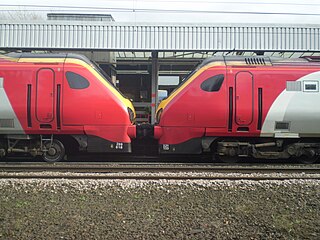
The Bombardier Voyager is a family of high-speed diesel-electric multiple-units built in Belgium by Bombardier Transportation, for service on the railway network of the United Kingdom. Construction of the Voyager family took place between 2000 and 2005, consisting of three classes - the Class 220 Voyager, Class 221 Super Voyager and Class 222 Meridian. These three classes are currently operated by CrossCountry, CrossCountry and Virgin Trains, and East Midlands Railway respectively.

CrossCountry is a train operating company in the United Kingdom owned by Arriva UK Trains, operating the New Cross Country franchise. It operates intercity and other long-distance trains across the country, but does not serve Greater London. It operates the UK's longest direct rail service from Aberdeen in the north-east of Scotland to Penzance in the south-west of England. It is one of only two franchised train operating companies that does not operate any stations, the other being Caledonian Sleeper. All services call at Birmingham New Street.

Passenger rail franchising in Great Britain is the system of contracting out the operation of the passenger services on the railways of Great Britain to private companies through a system of franchising.

East Coast, the trading name of the East Coast Main Line Company, was a British train operating company running the InterCity East Coast franchise on the East Coast Main Line between London, Yorkshire, North East England, and Scotland. East Coast ran long-distance inter-city services from its Central London terminus at London King's Cross on two primary routes; the first to Leeds and the second to Edinburgh via Newcastle with other services reaching into Yorkshire and Northern and Central Scotland. It commenced operations on 14 November 2009 and ceased on 28 February 2015.
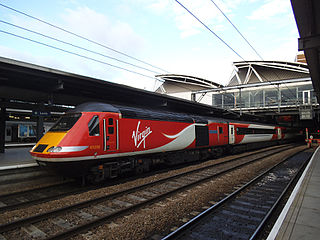
InterCity East Coast is a railway franchise for passenger trains on the East Coast Main Line in the United Kingdom from London King's Cross to Hull, Leeds, Bradford, Harrogate, Newcastle, Edinburgh, Glasgow, Inverness and Aberdeen. It was formed during the privatisation of British Rail and transferred to the private sector in April 1996.

Virgin Rail Group was formed by the Virgin Group to bid for rail franchises in the United Kingdom during the privatisation of British Rail in the late 1990s.

In Great Britain, there are inter-city trains to numerous parts of the country. Most of these trains are high speed, and some operate into France and Belgium.

ScotRail has been the brand name used for all Scottish regional and commuter rail services, including some cross-border services, since September 1983. Since 2008, it is the permanent name of the Scottish franchised rail services, regardless of the train operating company that operates them.

Virgin Trains East Coast (VTEC) was a train operating company in the United Kingdom that operated the InterCity East Coast franchise on the East Coast Main Line between London, Yorkshire, the North East and Scotland. It commenced operations on 1 March 2015, taking over from East Coast as a joint venture between Stagecoach (90%) and Virgin Group (10%).
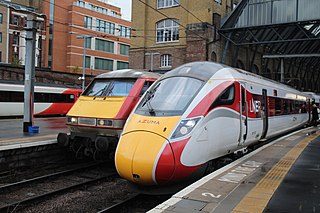
London North Eastern Railway (LNER) is a British train operating company owned by the Department for Transport (DfT), unlike most UK train operating companies. LNER operates the InterCity East Coast franchise providing long-distance inter-city services on the East Coast Main Line from London King's Cross to North East England and Scotland. LNER manages 12 stations itself and its trains call at 53 stations in total.